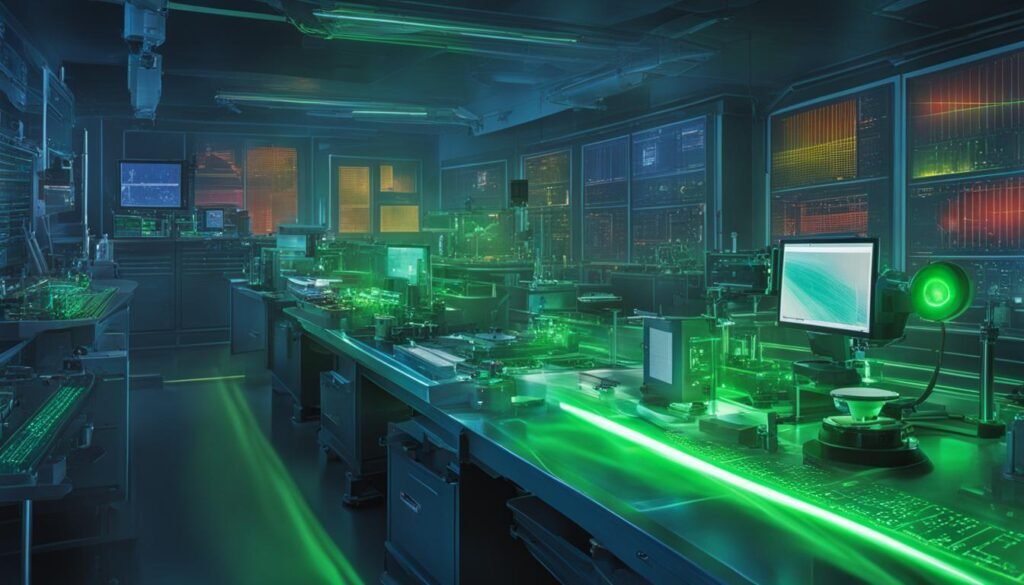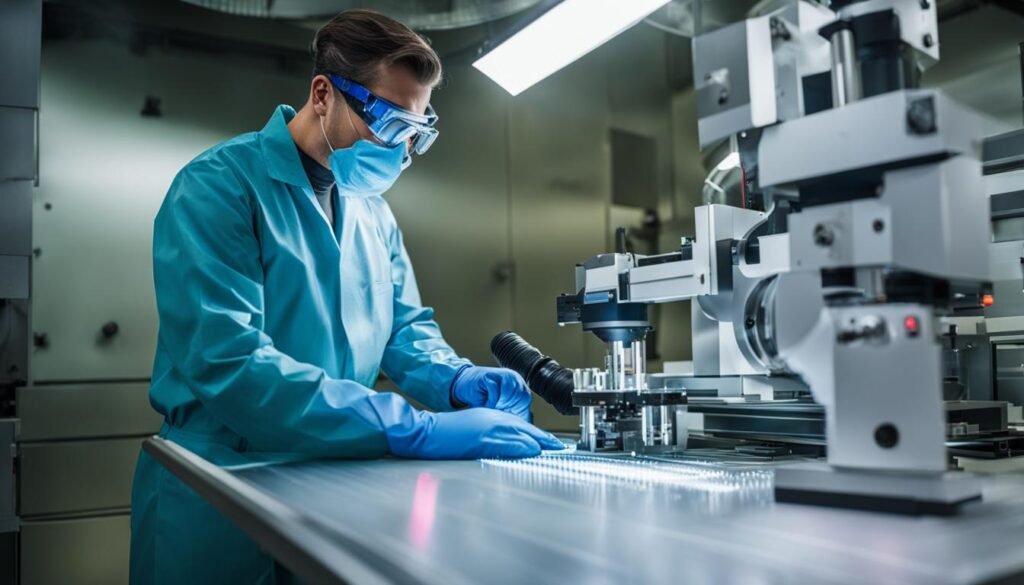A laser scientist is a professional who specializes in the field of laser technology and its applications. They are responsible for conducting research, designing laser systems, and advancing the use of lasers in various industries. Laser scientists play a crucial role in driving innovation and technological advancements in fields such as medicine, engineering, and telecommunications. In this article, we will delve into the role of a laser scientist and explore their contributions to the world of photonics.
Contents
- 1 What Does a Laser Scientist Do?
- 2 Importance of Laser Scientists
- 3 Duties and Responsibilities of Laser Scientists
- 4 Types of Laser Scientists
- 5 Laser Scientist Work Environment
- 6 Skills and Traits of Laser Scientists
- 7 Laser Science Education and Training
- 8 Salary and Job Outlook for Laser Scientists
- 9 Challenges and Opportunities in Laser Science
- 10 Ethical Considerations in Laser Science
- 11 Conclusion
- 12 FAQ
- 12.1 What is the role of a laser scientist?
- 12.2 What does a laser scientist do?
- 12.3 Why are laser scientists important?
- 12.4 What are the duties and responsibilities of laser scientists?
- 12.5 What are the different types of laser scientists?
- 12.6 Where do laser scientists work?
- 12.7 What skills and traits do laser scientists possess?
- 12.8 What education and training is required to become a laser scientist?
- 12.9 What is the salary and job outlook for laser scientists?
- 12.10 What are the challenges and opportunities in laser science?
- 12.11 What ethical considerations do laser scientists have?
- 12.12 How do laser scientists contribute to society?
- 13 Source Links
Key Takeaways:
- A laser scientist specializes in the field of laser technology and its applications.
- They conduct research, design laser systems, and advance the use of lasers in various industries.
- Laser scientists play a crucial role in driving innovation and technological advancements.
- Their work impacts fields such as medicine, engineering, and telecommunications.
- The future of laser technology holds immense potential for further advancements.
What Does a Laser Scientist Do?
Laser scientists are highly skilled professionals who engage in various activities related to laser science and technology. Their work involves designing and developing laser systems, conducting research and development, and exploring new applications for lasers. Let’s take a closer look at the key responsibilities and roles of laser scientists.
Laser System Design
One of the primary tasks of a laser scientist is designing laser systems that meet specific requirements for various applications. This involves understanding the physics of laser technology and the intricate components that make up a laser system. Laser scientists utilize their expertise to design systems that are efficient, reliable, and capable of delivering precise results. They consider factors such as power requirements, wavelength, and beam quality to ensure optimal performance.
Research and Development
Laser scientists are at the forefront of research and development efforts in the field of laser technology. They constantly seek to improve the performance and capabilities of lasers by exploring new materials, techniques, and applications. They conduct experiments, analyze data, and collaborate with other professionals to push the boundaries of laser science. Through their research, laser scientists contribute to advancements in fields such as medicine, manufacturing, and telecommunications.
Laser Applications
Another important aspect of a laser scientist’s role is the exploration and development of new applications for lasers. Laser scientists work closely with professionals from various industries to identify areas where lasers can be utilized effectively. They develop innovative solutions for industries such as healthcare, aerospace, and energy, applying their expertise to enhance processes and solve complex challenges. By discovering new ways to use lasers, laser scientists contribute to technological progress and drive innovation.
As laser technology continues to evolve, the role of laser scientists becomes increasingly critical in shaping the future of photonics. Their expertise in laser system design, research and development, and exploring new applications enables them to contribute significantly to advancements in various industries. Laser scientists are essential in driving innovation, improving efficiency, and pushing the boundaries of what lasers can achieve.
Importance of Laser Scientists
Laser scientists play a crucial role in driving innovation and technological progress. Their contributions have led to significant advancements in various fields, resulting in improved healthcare, communication, and manufacturing processes. The continuous development of laser technology would not be possible without the expertise and dedication of laser scientists.
The importance of laser scientists can be seen through the advancements made in laser technology. Their research and experimentation have paved the way for new applications and improved efficiency in various industries. For example, lasers are now widely used in surgical procedures, allowing for more precise incisions and reducing the risks associated with traditional surgery. In the manufacturing sector, laser cutting and welding techniques have revolutionized the production process, enabling greater accuracy and efficiency.
“Laser scientists are the driving force behind the progress of laser technology. Their work impacts society as a whole, providing us with improved healthcare, better communication systems, and enhanced manufacturing capabilities.”
Moreover, laser scientists contribute to technological progress by pushing the boundaries of what is possible with lasers. They explore new applications and develop innovative solutions that address the needs of various industries. Through their research and development efforts, laser scientists have made significant advancements in fields such as telecommunications, where lasers are used for long-distance transmission of information.
| Advancements | Impact |
|---|---|
| Use of lasers in surgery | Precise incisions, reduced risks |
| Laser cutting and welding | Greater accuracy and efficiency in manufacturing |
| Telecommunications | Long-distance transmission of information |
Overall, laser scientists are at the forefront of advancing laser technology and its applications. Their work not only improves the quality of life for individuals but also drives economic growth and societal progress. As technology continues to evolve, the role of laser scientists will remain pivotal in shaping a future where lasers play an even greater role in our daily lives.

Duties and Responsibilities of Laser Scientists
Laser scientists have diverse duties and responsibilities in their role. They are involved in designing laser systems that meet specific requirements for various applications. This includes understanding the physics of laser technology and the components that comprise a laser system. Laser scientists also participate in testing and optimizing laser systems, ensuring they perform effectively. Additionally, they are responsible for troubleshooting any issues that arise with laser systems. Laser scientists often collaborate with other professionals, such as physicists, engineers, and medical professionals to develop and optimize laser systems for specific industries or applications.
One of the primary responsibilities of laser scientists is laser system design. They use their expertise to design laser systems that meet the needs of specific applications. This involves understanding the requirements of the application and selecting the appropriate laser sources, optics, and electronic components to ensure optimal performance. Laser scientists also play a crucial role in testing and optimizing laser systems. They conduct experiments and analyze data to ensure that the laser system meets the desired specifications and efficiency.
In addition to design and testing, laser scientists are also responsible for troubleshooting any issues that may arise with laser systems. This requires a deep understanding of the underlying physics and technology of lasers. Laser scientists use their expertise to identify and resolve any problems that may affect the performance or functionality of the laser system. They employ analytical thinking and problem-solving skills to diagnose and rectify the issues, ensuring that the laser system operates as intended.
The role of a laser scientist also involves collaboration with other professionals. Laser scientists often work in interdisciplinary teams, collaborating with physicists, engineers, and medical professionals to develop and optimize laser systems for specific industries or applications. This collaborative approach allows for a comprehensive understanding of the requirements and challenges of different fields and ensures that laser systems are tailored to meet specific needs. Effective communication and teamwork are essential for successful collaboration in the field of laser science.
Key Responsibilities of Laser Scientists:
- Designing laser systems for specific applications
- Testing and optimizing laser systems for performance and efficiency
- Troubleshooting issues with laser systems
- Collaborating with professionals from different disciplines
Overall, laser scientists play a critical role in the design, testing, and optimization of laser systems. Their expertise and collaboration with other professionals contribute to the advancement of laser technology and its applications in various industries.
Types of Laser Scientists
Within the field of laser science, there are several specialized roles that professionals can pursue. Each role focuses on different aspects of laser technology and its applications. Let’s explore some common types of laser scientists:
Laser Systems Engineer
A laser systems engineer specializes in designing and developing laser systems for specific applications. They have a deep understanding of the physics and engineering principles behind laser technology. Their expertise allows them to create laser systems that meet the specific requirements of various industries and applications.
Optoelectronic Engineer
Optoelectronic engineers focus on the design and development of devices that convert electrical signals into light and vice versa. They work with laser technology to create efficient and reliable optoelectronic devices, such as lasers, photodetectors, and light-emitting diodes (LEDs).
Laser Safety Engineer
Laser safety engineers play a crucial role in ensuring the safe use of laser systems. They develop safety protocols and guidelines to protect individuals from potential hazards associated with lasers. Laser safety engineers also conduct risk assessments and implement safety measures to minimize the risks associated with laser technology.
Laser Manufacturing Engineer
Laser manufacturing engineers specialize in optimizing laser-based manufacturing processes. They work closely with industries such as automotive, aerospace, and electronics to improve efficiency, precision, and quality in manufacturing. Laser manufacturing engineers apply their knowledge of laser technology to enhance processes such as cutting, welding, and additive manufacturing.
Laser R&D Engineer
Laser research and development (R&D) engineers are responsible for driving advancements in laser technology. They explore new applications, conduct experiments, and develop new types of lasers. Laser R&D engineers collaborate with other professionals to push the boundaries of laser science and develop innovative solutions.
These are just a few examples of the different types of laser scientists in the field. Each role brings unique expertise and contributes to the overall advancement of laser technology and its applications.

Laser Scientist Work Environment
Laser scientists can work in various environments depending on their specialization. They may work in research labs, where they conduct experiments and develop new laser technologies. In manufacturing facilities, laser scientists optimize laser-based manufacturing processes and oversee production. In medical centers, they focus on designing and testing laser systems for medical procedures. Laser scientists often collaborate with professionals from different disciplines, such as physicists, engineers, and medical professionals, to ensure the development of effective laser systems.
Working in research labs allows laser scientists to explore new ideas, conduct experiments, and push the boundaries of laser technology. These labs are equipped with state-of-the-art equipment and provide a conducive environment for innovation and discovery. The collaboration with other scientists and researchers fosters a culture of knowledge sharing and encourages interdisciplinary collaboration.
In manufacturing facilities, laser scientists work alongside engineers and technicians to optimize laser-based manufacturing processes. They ensure that laser systems are properly integrated into the production line and meet the required specifications. This often involves troubleshooting technical issues, conducting tests, and implementing improvements to enhance the efficiency and effectiveness of laser-based manufacturing.
Medical centers offer laser scientists an opportunity to apply their expertise in healthcare settings. They work closely with medical professionals to design and test laser systems used in various medical procedures. Laser scientists play a vital role in ensuring the safety and efficacy of laser technologies in medical applications. This includes developing protocols, conducting clinical trials, and collaborating with healthcare providers to improve patient outcomes.

Collaboration in Laser Research
Collaboration is an essential aspect of a laser scientist’s work environment. Laser scientists often collaborate with professionals from different fields, including physicists, engineers, and medical professionals. This collaboration allows for a holistic approach to laser research and development, combining expertise from various disciplines.
“Collaboration is key in laser research. By working together, we can leverage our diverse skills and knowledge to tackle complex problems and make significant advancements in laser technology.” – Dr. Sarah Martinez, Laser Scientist
Collaboration fosters the exchange of ideas, cross-pollination of expertise, and accelerates progress in laser research. It allows laser scientists to tap into different perspectives, enabling innovative solutions and breakthroughs. By working together, laser scientists can address the challenges and complexities of laser technology and develop practical solutions that benefit society as a whole.
The Future of Laser Science
The work environment for laser scientists is dynamic, with new opportunities and challenges emerging as technology advances. The future of laser science holds immense potential for further innovation and growth. As laser technology continues to evolve, laser scientists will play a vital role in driving advancements in various industries.
- Research Labs: Continue to be the hub of innovation, where laser scientists conduct experiments, explore new applications, and push the boundaries of laser technology.
- Manufacturing Facilities: Laser scientists will contribute to optimizing laser-based manufacturing processes, improving efficiency, and driving productivity.
- Medical Centers: Laser scientists will work closely with healthcare providers to develop and refine laser technologies for medical procedures, enhancing patient outcomes.
With ongoing collaboration, investment in research, and the dedication of laser scientists, the future of laser science holds exciting possibilities. It is a field that promises continued advancements, improved applications, and a profound impact on various industries and society as a whole.
Skills and Traits of Laser Scientists
Laser scientists possess a unique set of skills and traits that contribute to their success in the field. These professionals rely on their analytical skills to understand the complexities of laser technology and optimize laser systems for various applications. With their problem-solving skills, laser scientists are able to identify and troubleshoot issues that may arise during the design and development process. Effective communication skills are essential for collaborating with professionals from different disciplines, such as physicists, engineers, and medical professionals.
Additionally, creativity plays a significant role in the work of laser scientists. They are constantly exploring new applications and pushing the boundaries of laser technology. This innovative mindset allows them to develop cutting-edge solutions and drive advancements in the field. By thinking outside the box, laser scientists contribute to the continuous improvement and evolution of laser technology.
It is important to note that laser scientists possess a deep passion for their work. They are driven by curiosity and a genuine interest in advancing the field of photonics. This passion fuels their dedication to continuous learning and staying updated with the latest advancements in laser technology. Laser scientists are committed to pushing the boundaries of what is possible, and their relentless pursuit of knowledge and excellence is what sets them apart.
Key Skills and Traits of Laser Scientists:
- Analytical skills for understanding laser technology
- Problem-solving skills for troubleshooting and developing solutions
- Effective communication skills for collaborating with professionals from different disciplines
- Creativity for exploring new applications and driving innovation
- Passion and dedication to the field of laser science
- Continuous learning and staying updated with advancements in laser technology
Table: Comparative Analysis of Skills and Traits
| Skill/Trait | Laser Scientists | Other Professionals |
|---|---|---|
| Analytical skills | High proficiency | Varies depending on field |
| Problem-solving skills | Expertise in troubleshooting laser systems | Varies depending on field |
| Communication skills | Effective collaboration with diverse professionals | Varies depending on field |
| Creativity | Innovative mindset for exploring new applications | Varies depending on field |
| Passion and dedication | Deep commitment to advancing laser science | Varies depending on field |
| Continuous learning | Staying updated with laser technology advancements | Varies depending on field |
Laser Science Education and Training
In order to pursue a career as a laser scientist, individuals typically need to acquire a strong educational foundation in laser science and related fields. Many laser scientists hold a bachelor’s or master’s degree in disciplines such as physics, engineering, or photonics. These degrees provide a solid understanding of the fundamental principles of laser technology and its applications.
Specialized courses in laser science, optics, and photonics are also highly beneficial for laser scientists. These courses offer in-depth knowledge and practical skills in areas such as laser system design, testing, and optimization. They enable laser scientists to develop a comprehensive understanding of the physics behind laser technology and its various components.
Hands-on training and practical experience are crucial for laser scientists to hone their skills and gain expertise in laser system design and development. This can be obtained through internships, research projects, or collaboration with industry professionals. Continuous learning and staying updated with the latest advancements in laser technology are essential for laser scientists to stay at the forefront of their field and make meaningful contributions to the industry.
| Education and Training | Key Components |
|---|---|
| Bachelor’s or Master’s Degree | – Physics, Engineering, or Photonics – Fundamental principles of laser technology |
| Specialized Courses | – Laser Science – Optics and Photonics – Laser System Design – Testing and Optimization |
| Hands-on Training | – Internships and Research Projects – Collaboration with Industry Professionals |
By obtaining the necessary education, specialized training, and practical experience, laser scientists are equipped with the knowledge and skills required to excel in their careers. They are prepared to tackle the challenges of designing and optimizing laser systems, explore new applications, and contribute to the ongoing advancements in laser technology.
Salary and Job Outlook for Laser Scientists
As laser technology continues to advance and find new applications in various industries, the demand for laser scientists is growing. Laser scientists are highly skilled professionals who play a crucial role in driving innovation and technological progress. Their expertise in designing and developing laser systems makes them valuable assets in industries such as healthcare, manufacturing, and telecommunications.
In terms of salary, laser scientists generally earn competitive incomes due to the specialized nature of their work. According to industry reports, the average salary for laser scientists ranges from $80,000 to $120,000 per year, depending on factors such as education, experience, and industry. Laser scientists with advanced degrees and extensive experience may earn even higher salaries.
| Experience Level | Salary Range |
|---|---|
| Entry Level | $80,000 – $90,000 |
| Mid-Level | $90,000 – $110,000 |
| Senior Level | $110,000 – $120,000+ |
The job outlook for laser scientists is promising, as the field of laser technology is expected to experience steady growth in the coming years. Advancements in laser technology are driving the demand for laser scientists across industries, creating new opportunities for career growth and development. Laser scientists who stay updated with the latest advancements and continuously enhance their skills will have favorable job prospects in this rapidly evolving field.
Furthermore, with the increasing adoption of lasers in various industries, the need for laser scientists is projected to continue rising. This growth is fueled by the demand for improved healthcare procedures, enhanced communication systems, and more efficient manufacturing processes. As laser technology becomes increasingly integral to the functioning of modern society, the role of laser scientists will become even more crucial.
Challenges and Opportunities in Laser Science
Laser science presents both challenges and opportunities for scientists in the field. As laser technology continues to advance, researchers face the challenge of keeping up with the latest developments and pushing the boundaries of what is possible. This requires continuous research and development, as well as funding for innovation. To stay at the forefront of laser technology, scientists must secure research funding to support their projects and drive advancement in the field.
Interdisciplinary collaboration is also crucial in laser science. The field is inherently multidisciplinary, requiring expertise from various disciplines such as physics, engineering, and medicine. Collaborating with professionals from different backgrounds allows laser scientists to gain insights from different perspectives and leads to innovative solutions. Interdisciplinary collaboration fosters the exchange of knowledge and ideas, enabling scientists to explore new applications and address complex challenges.
Despite the challenges, opportunities abound in laser science. The advancements in laser technology have opened doors to new applications in industries such as healthcare, telecommunications, and manufacturing. Laser scientists have the opportunity to contribute to these advancements by developing new laser systems and optimizing existing ones. The continuous improvement and innovation in laser technology offer exciting prospects for scientists to make significant contributions in their field and shape the future of photonics.
Advancements in Laser Technology
Laser technology has seen remarkable advancements in recent years. From faster and more efficient laser systems to new applications in various industries, the field of laser science is constantly evolving. Researchers are constantly pushing the boundaries of what laser technology can do, and the possibilities are endless.
One of the key areas of advancement in laser technology is in the development of more powerful and precise laser systems. Scientists are constantly working on improving laser performance, making them more efficient, and increasing their power output. This allows for a wider range of applications, from cutting-edge medical procedures to high-speed telecommunications.
| Advancements in Laser Technology | Impact |
|---|---|
| Increase in laser power | Enables more efficient cutting and welding in manufacturing processes |
| Development of ultrafast lasers | Enables precise and rapid medical procedures, such as laser eye surgery |
| Miniaturization of laser systems | Opens up new applications in portable devices and wearable technology |
Another significant advancement in laser technology is the development of ultrafast lasers. These lasers are capable of emitting extremely short pulses of light, allowing for precise and rapid procedures in fields such as medicine and materials processing. Laser eye surgery, for example, relies on ultrafast lasers to reshape the cornea with unparalleled precision.
Miniaturization is also a key advancement in laser technology. As laser systems become smaller and more compact, they can be integrated into portable devices and wearable technology. This opens up new possibilities for applications such as laser-based sensors, mobile healthcare devices, and augmented reality headsets.

Overall, advancements in laser technology present exciting opportunities for laser scientists. By staying at the forefront of these advancements and collaborating with experts from different fields, laser scientists can contribute to the continuous progress in laser science and shape the future of photonics. The challenges and opportunities in laser science make it an intriguing and dynamic field for researchers passionate about pushing the boundaries of what is possible.
Ethical Considerations in Laser Science
Laser science is a field that comes with important ethical considerations, particularly regarding laser safety and the responsible use of laser technology. Laser scientists have a responsibility to ensure the well-being of individuals and the environment when working with lasers. Safety protocols and regulations are in place to minimize the potential hazards associated with laser use and protect both users and bystanders.
Adhering to laser safety guidelines is crucial in minimizing the risk of accidents or injuries. Laser scientists must stay updated on the latest safety protocols and practices to ensure that their work aligns with ethical standards. This includes proper training on laser safety procedures, such as the use of protective eyewear and implementing safety interlocks.
“Safety is our top priority when it comes to laser technology,” says Dr. Rebecca Carter, a laser scientist with over a decade of experience in the field. “We work diligently to ensure that lasers are used responsibly and that potential risks are mitigated. It’s essential to prioritize safety in all aspects of laser science.”
In addition to safety, ethical considerations also extend to the use of laser technology in various applications. Laser scientists must carefully evaluate the potential risks and benefits of using lasers in different industries, such as medicine, manufacturing, and telecommunications. They must weigh the advantages of laser technology against any potential harm it may cause to individuals or the environment.
Regulations play a vital role in ensuring the ethical use of laser technology. Government agencies and regulatory bodies establish guidelines to govern the use of lasers, set exposure limits, and enforce safety standards. Compliance with these regulations is essential for laser scientists to operate ethically and responsibly.
| Ethical Considerations | Key Points |
|---|---|
| Laser Safety | – Adherence to safety protocols and regulations to protect individuals and the environment – Proper training and use of protective measures |
| Ethical Use of Laser Technology | – Evaluation of potential risks and benefits in different applications – Weighing advantages against potential harm |
| Regulations | – Guidelines established by government agencies and regulatory bodies – Compliance with safety standards |
Conclusion
Laser scientists play a vital role in advancing laser technology and its applications. With their expertise and dedication, they drive innovation and progress in various industries, making significant contributions to society. By designing and developing laser systems, laser scientists improve healthcare procedures, enhance communication systems, and optimize manufacturing processes.
The future of laser technology holds immense potential, and laser scientists are at the forefront of shaping its trajectory. As technology continues to evolve, laser scientists will continue to explore new applications and push the boundaries of what lasers can do. With their analytical skills, problem-solving abilities, and creativity, laser scientists will drive the development of cutting-edge laser systems that meet the ever-evolving needs of society.
As laser technology continues to advance, laser scientists will play a crucial role in addressing ethical considerations. They will ensure the responsible and safe use of laser technology, adhering to strict safety protocols and regulations. By prioritizing laser safety and considering the potential risks and benefits, laser scientists will continue to contribute to the ethical and sustainable use of laser technology.
In conclusion, laser scientists have a significant impact on the world of photonics. Their contributions improve the lives of individuals and drive technological progress. With a promising job outlook and a future full of opportunities, laser scientists will continue to pave the way for the advancement of laser technology, making a positive difference in society.
FAQ
What is the role of a laser scientist?
Laser scientists specialize in the field of laser technology and its applications. They conduct research, design laser systems, and advance the use of lasers in various industries.
What does a laser scientist do?
Laser scientists are involved in designing and developing laser systems, understanding the physics of laser technology, conducting research and development, and exploring new applications for lasers in industries such as manufacturing, telecommunications, and medicine.
Why are laser scientists important?
Laser scientists drive innovation and technological progress in various industries. Their contributions have led to advancements in healthcare, communication, and manufacturing processes.
What are the duties and responsibilities of laser scientists?
Laser scientists are responsible for designing laser systems, testing and optimizing their performance, troubleshooting issues, and collaborating with professionals from different disciplines to develop effective laser systems.
What are the different types of laser scientists?
Some common types of laser scientists include laser systems engineers, optoelectronic engineers, laser safety engineers, laser manufacturing engineers, and laser research and development engineers.
Where do laser scientists work?
Laser scientists can work in research labs, manufacturing facilities, and medical centers. They often collaborate with professionals from different disciplines to ensure the development of effective laser systems.
What skills and traits do laser scientists possess?
Laser scientists possess analytical and problem-solving skills, effective communication skills, creativity, and a commitment to continuous learning and staying updated with advancements in laser technology.
What education and training is required to become a laser scientist?
Many laser scientists hold a bachelor’s or master’s degree in physics or engineering. Specialized courses in laser science, optics, and photonics, as well as hands-on training, are beneficial for developing the necessary skills.
What is the salary and job outlook for laser scientists?
The salary of laser scientists can vary depending on factors such as education, experience, and industry. The job outlook for laser scientists is promising, with the field experiencing steady growth due to advancements in various industries.
What are the challenges and opportunities in laser science?
Advancements in laser technology require continuous research and development and funding for innovation. Laser scientists may face technical hurdles but also have opportunities for innovation and breakthroughs through interdisciplinary collaboration.
What ethical considerations do laser scientists have?
Laser scientists adhere to safety protocols and regulations to ensure the responsible and ethical use of laser technology. They prioritize laser safety and consider the ethical use of laser technology in various applications.
How do laser scientists contribute to society?
Laser scientists drive innovation and progress in laser technology, leading to advancements in healthcare, communication, and manufacturing processes, improving society as a whole.



